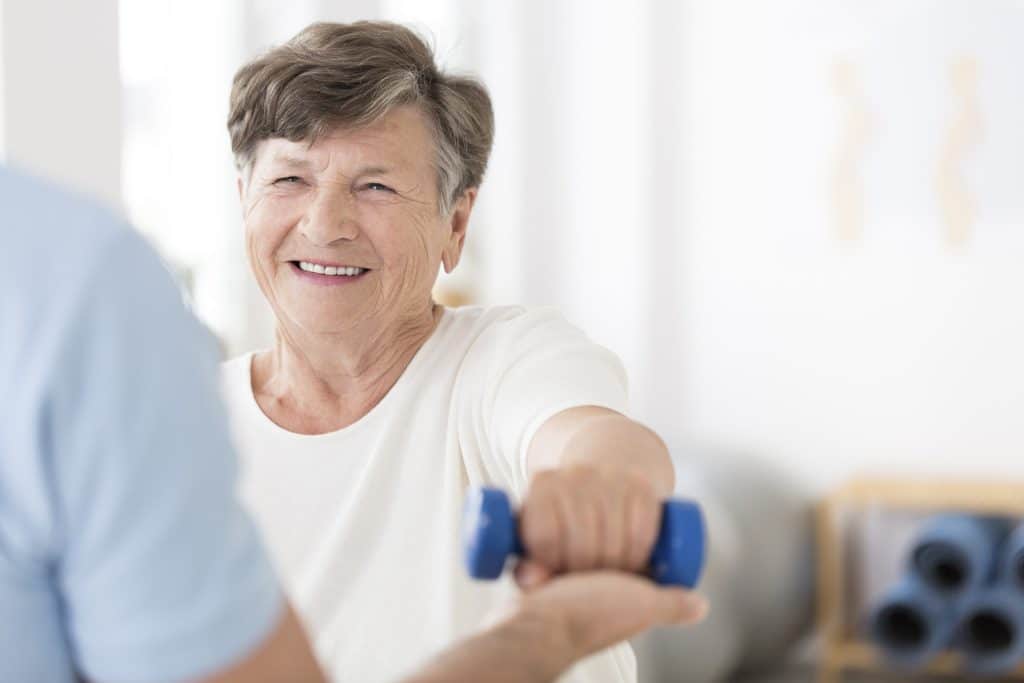The longer we live, the more important our health becomes. Freedom of movement, freedom from pain, and general good health all add up to mean more independence in our golden years. So how do we maintain our bodies and our minds (and encourage our loved ones to do the same) in the face of aging? Here are some expert tips to get started.
Know the basics
Physical fitness includes four basic categories. Here’s what you need to know about each and how they can help seniors gain and maintain fitness.
Endurance
Endurance refers to the health of your heart and lungs. When you build endurance, you gain a healthier cardiovascular system and can even reverse some of the effects of diseases such as coronary artery disease, which are more common in elderly adults.
Some examples of exercises to increase endurance for seniors are walking, swimming (or water aerobics), biking, and dancing. If you or your loved one enjoys more social ways of getting exercise, transportation and companionship services from a trusted home healthcare agency can help!
Strength
Strength means increased muscle mass and stronger muscles. If your aging loved one is not strong enough to lift weights, he or she can try strength training with resistance bands.
Balance
Balance is important for preventing falls, especially in older adults. A few ways to work on this are to practice standing on one foot (only if it’s safe to do so, of course), walk toe to toe, or try some gentle Tai Chi or yoga.
Flexibility
Flexibility involves stretching muscles and increasing the ability to move. Some simple stretches appropriate for seniors can be found here.
Benefits
Most people understand that exercise is good for us, but they may not fully understand all the good that can come from maintaining a regular fitness routine. So why is it important for older adults to exercise? Here are some of the top benefits:
- improved strength and balance, resulting in increased independence and decreased risk of falls and other injuries
- increased energy
- prevention or delay of diseases, such as heart disease, diabetes, osteoporosis, and even some forms of cancer
- improved mood and decreased depression
- improve cognitive function (how the brain works)
Safety tips
Seniors should check with a doctor before beginning any fitness program to make sure it is safe for them to exercise.
Loose, comfortable clothing and well-fitting, sturdy shoes are ideal for most types of exercise (with the exception of swimming, of course). Seniors who are not already active should begin slowly. Starting slowly makes injury less likely to occur and helps prevent soreness.
Older adults should only exercise if they are feeling well. If you or your loved one is suffering from a cold, the flu or another illness, postpone exercise until fully recovered and start slowly when you do feel well enough to exercise again.
For seniors, it may be safest to exercise with another adult such as a family member or caregiver present. If you or your loved one finds joy and independence in movement, in-home senior care can help maintain and support regular exercise.
The power of habit
Research has shown that it takes between 18 and 254 days to form a habit. Many factors can affect this length of time, including personality, environment, and commitment, but one thing is clear – once the habit is formed, we are much more likely to continue the activity. This is great news for healthy habits such as exercise!
The hardest part is making exercise a habit in the first place. Here are some tips to do just that.
- Start small. Whether it’s walking up and down the hall a few times or doing some gentle stretches in a chair, the important thing is to move.
- Challenge yourself, but don’t overdo it. Setting goals and working toward them can be very motivating. Just make sure that the goals are safe and realistic.
- Be patient with yourself and don’t give up if you miss a workout (or two, or even twenty!)
- Use reminders, whether it’s writing it on a calendar, signing up for a class, or having a loved one or trusted caregiver prompt you or your loved one that it’s time to exercise.
- Do something you enjoy! If you or your loved one has always enjoyed gardening, for example, this can be a great way to get outdoors and move around. A personal caregiver can help make this and other activities safe and rewarding experiences for all.
Don’t forget good nutrition
Your car runs best when it’s well taken care of and has enough gas in the tank. The same is true for your body. In order to support regular exercise, good nutrition is key. We need protein to help build strong muscles, carbohydrates to fuel aerobic exercise, and a host of other vitamins and nutrients to keep our bodies healthy. If you or your loved one struggles with eating or preparing regular meals, a home healthcare agency can help, providing the peace of mind – and necessary food – to keep seniors healthy and fit for years to come.
